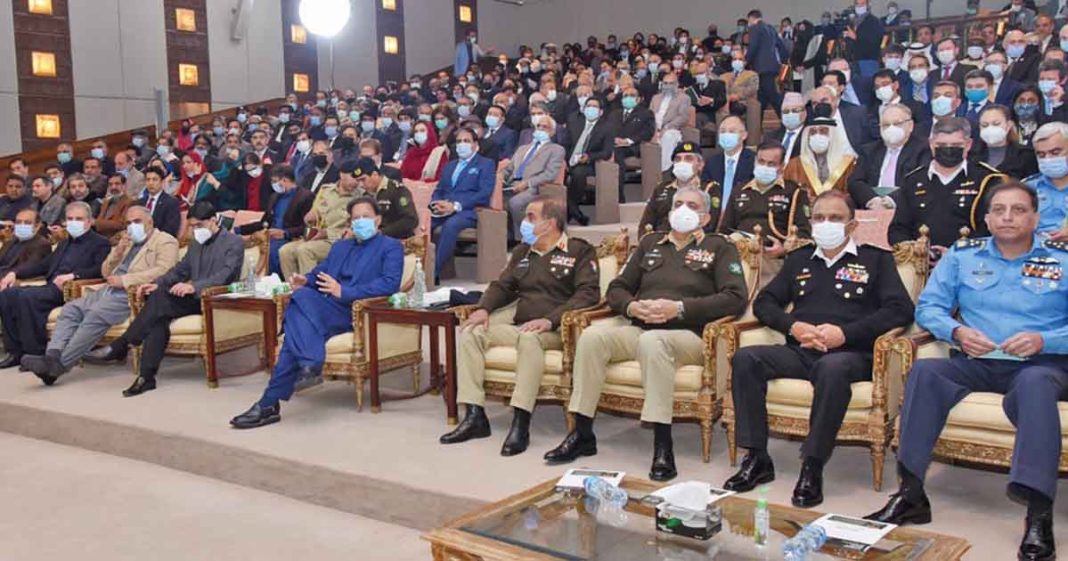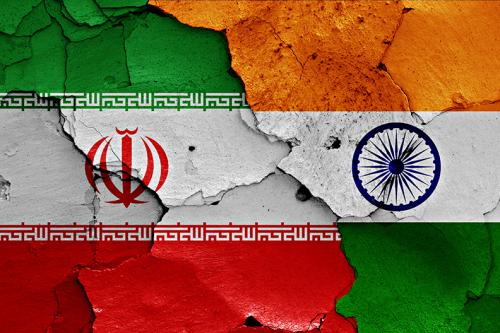This week, Pakistan formally issued its first comprehensive National Security Policy (NSP) document, through a consensus of the civilian and military leadership in the country. The NSP, only 50 pages of which have been released for public consumption, attempts to articulate a citizen-centric ‘Comprehensive National Security’ framework that places “economic security” at the “core” of Pakistan’s new national security paradigm.
For this purpose, the NSP emphasises on the importance of “a geo-economic vision to supplement the focus on geo-strategy, and recognises that sustainable and inclusive economic growth is needed to expand our national resource pie”, which in turn will “allow greater availability of resources to bolster traditional and human security.”
Expanding on this overarching economic and geo-security objective, the NSP document tranches policy imperatives into eight distinct sections, encompassing details concerning 1) Policy Formulation; 2) National Security Framework; 3) National Cohesion; 4) Securing Economic Future; 5) Defence and Territorial Integrity; 6) Internal Security; 7) Foreign Policy In a Changing World; 8) and Human Security. Each of these sections include policy statements, in broad (almost unascertainable terms) the respective overarching objectives of Pakistan. What is missing, however, is the ‘mechanism’ for achieving the stated objectives.
Read more: How Russia can play an important role in implementing Pakistan’s National Security Policy?
It is heartening that Pakistan has finally moved away from its narrow prism of military-based security doctrine, and instead articulates a broad and encompassing definition of ‘national security’, which encompasses economic and human factors. To this end, of course Pakistan wants to maintain peace in the region, expand its economic connectivity routes, deepen its strategic entrenchments, ensure food security, water reserves, and some mechanism to stem the unbridled population control.
However, many questions remain unanswered: how will we do it? Does articulating the policy—encouraging as it is—translate into necessary action? If not, what processes and objectives have been envisioned to ensure that such action is taken in due course? What steps have been stipulated for charting this course? What is the monitoring mechanism for implementation of the NSP? In case some department or ministry of the Federal or Provincial government(s) fails to act in accordance with the NSP, what would be the consequences?
Also, how does the National Action Plan, formulated in 2015, fit within the ambit of the NSP? Since no action has been taken against civilian institutions that failed (at least in part) to implement the National Action Plan, is there any reason to hope that the NSP will be implemented in letter and spirit? Furthermore, the NSP outlines the policy objectives for the period of 2022–2026.
Read more: How Indians reacted to Pakistan’s National Security Policy
However, in all likelihood, at least one civilian government will lapse during this time, and perhaps multiple changes will take place in our military leadership. In the circumstances, what is the mechanism for institutional entrenchment of the NSP, designed to ensure that change in civil or military leadership will not uproot this plan?
These questions need answering. And we hope that the national security establishment of Pakistan will provide answers, in due course. In the meantime, the new national-security doctrine, articulated through the NSP, promises a better and brighter future for Pakistan. While implementation of this ideology will require consistency in political will, and a conducive domestic environment, the endeavour itself is admirable.
The world is changing. And Pakistan needs to change with it. The past two decades of international policy and regional strategy have been a tremendous challenge for Pakistan. In the aftermath of 9/11, and the consequent war in Afghanistan, international powers started to view Pakistan exclusively through the lens of ‘global Islamic terror’ (to use Donald Trump’s words). Making matters worse, Pakistan had to fight its own internal war on terror, which has claimed thousands of innocent lives and cost us billions of dollars in economic fallout.
Throughout this time, the ‘enemies’ of Pakistan (led by neighbouring India) lobbied the Washington circles to permanently realign its vision of Pakistan. It was argued that US’ policy concerning Pakistan could no longer be seen in the context of ‘South Asia’ or the ‘subcontinent’. Instead, Washington was gradually persuaded to view Pakistan in the context of Afghanistan alone, decoupling other countries of South Asia from this region of ‘terror’.
Read more: Understanding India’s collapse in the Indo-Pacific
As a result, owing primarily to India’s lobbying in Washington, a tectonic shift in the US policy took place in 2008, when Richard Holbrooke, President Obama’s special representative in the region, started using the term “Af-Pak” to club Pakistan with Afghanistan, as having a single political and military situation, requiring joint policy for ‘war on terror’ in the region.
Even more importantly, with the introduction of ‘Af-Pak’ policy by the United States (the only global super-power on the scene at the time), India had successfully disentangled itself from Pakistan, seeking ‘greener’ pastures on the international stage. India was made part of Pentagon’s Quadrilateral Security Dialogue (QSD, also known as the Quad)—created in 2007, which included Australia, India, Japan and the United States.
While Pakistan was still trying to grapple with the new foreign policy, India pushed its global agenda forth. Specifically, it portrayed itself as a counterweight to China in this region. The most concrete step, in this regard, came on May 30, 2018, when the United States Defence Secretary of the time (Jim Mattis) announced that Pentagon’s Pacific Command was being renamed as ‘Indo-Pacific Command’, giving India a larger role in the Pacific theatre, in pursuit of containing and countering China.
This was a significant policy shift in Washington. It meant that Delhi had convinced the Pentagon that it could serve as a counterweight to China in the Pacific region, while also destabilising China’s economic interest across the region—and in particular the CPEC project. Thus India’s open threats of infiltrating Gilgit-Baltistan, and disrupting the CPEC supply route.
Read more: NSA Moeed Yusuf’s interview is a reflection of ‘Naya Pakistan’
However, the past two years have exposed India’s bluff. As China crossed over the borders of Indian-held Ladakh, claiming important vantage points in Pangong Lake and the Galwan Valley, there has been no real resistance or counter from India. In the aftermath, Nepal has also claimed territory within the Indian boundary.
Making matters worse for India, Chinese have continued to expand their influence (and military presence) across the Indian Ocean (including Gwadar), with no real challenge or interference from India. In fact, many areas close to India (e.g. in Sri Lanka) are places where the Chinese have made long-term investments, and exercise control that can result in a blockade of the Indian Navy. And all attempts by India to involve its coalition partners from the Quad (i.e. United States, Australia, and Japan) have fallen on deaf ears.
In this new and dynamic regional/global environment, Pakistan must take proactive steps to claim its space. And the NSP is an important step in this regard.
Read more: Should the world brace itself for a new regional war?
The real challenges, however, still lie ahead. The most important of which will be Pakistan’s resolve to implement what it has articulated in the NSP. And for this, our State institutions and political operatives must set aside petty quibbles, and (together) grasp the reigns of tomorrow.
Saad Rasool is a lawyer based in Lahore. He has an LL.M. in Constitutional Law from Harvard Law School. He can be reached at saad@post.harvard.edu, or on Twitter: @Ch_SaadRasool. This article originally appeared in The Nation under the title, “National security doctrine” and has been republished with the author’s permission. The views expressed in this article are the author’s own and do not necessarily reflect the editorial policy of Global Village Space.














